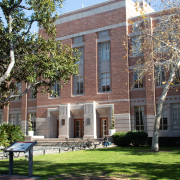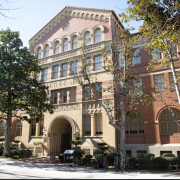It is a truth universally acknowledged that service groups, eager to make a meaningful impact on their communities, must be in want of volunteers. At least, that’s what Arianna Carlos thought at the beginning of her freshman year.
Carlos — who is now a junior majoring in law, history and culture — recalled her excitement to join USC Helenes during her first semester. The organization, as “the official hosts of the University of Southern California,” devotes itself to serving the campus and Los Angeles community by partnering with organizations like the Downtown Women’s Center and the Los Angeles Regional Food Bank. The group also prides itself on being a family, and it has recently expanded its efforts in diversity, equity and inclusion. Carlos said she liked Helenes because it combines service and community.
She wasn’t expecting the intense recruitment process, though. Helenes’ recruitment included two weeks of volunteering events, an information session, a written application, a group interview and an exam that test-takers must score 90% on to pass. Carlos made it through the entire process, but ultimately was denied membership. She was never told why.
“It just was disappointing … I hadn’t applied to anything else, because I wasn’t expecting things to be so selective,” Carlos said. “It was discouraging, too, because I didn’t really apply to anything the next semester, either.”
Helenes stands apart from other service organizations at USC because of its emphasis on family; it’s a social organization as well. But the phenomenon of the highly selective service organization isn’t exclusive to Helenes. Many — if not most — service organizations at USC have some type of application process. As recognized student organizations, they benefit from student government funding and campus facility resources. But under University rules, RSOs cannot be exclusive with their membership. The RSO Resource Guide lists open membership as a requirement for RSOs. There is an exception if an application process is “based on the purpose of the organization.”
According to Emily Sandoval, the associate vice provost for student affairs, student development and engagement, an application’s purpose should only be to gather information about the organization’s members. It shouldn’t be used as a tool to limit membership. Sandoval also said that RSO guidelines do not allow organizations to require members to attend recruitment events for admission.
EngageSC, the University’s student organizations directory, lists over one hundred RSOs that include service as part of their missions. There’s no authority tracking how many of these organizations are selective.
It’s hard to believe that most USC students, who already must be some of the country’s most outstanding to be admitted, are unqualified to be volunteers. It’s also hard to believe that most USC students, if given the opportunity to do community service, wouldn’t be dedicated to their jobs. But that seems to be what some RSOs are arguing to maintain their exclusivity.
For Anthony Guan, the president of Mobile Clinic at USC and a junior majoring in human development and aging, his organization’s selectivity is directly linked to its mission. Mobile Clinic partners with several L.A. shelters to offer preventative screenings and health literacy resources. Guan estimated that his group took nine out of 70 applicants in the fall semester. He said the decision was made by the organization’s executive board to provide more consistent care for its high-risk patients.
“I think that our mission has always been to put patients first. And what that means is oftentimes, we can’t take as many volunteers as we want to,” Guan said. “The fear within our team is that if we don’t limit the amount of volunteers, our organization becomes focused on USC students getting experience rather than patients getting the best possible care.”
Guan said that patients who visit Mobile Clinic’s shelters might already be wary of medical intervention. Mobile Clinic’s small size would ensure that these patients see familiar faces instead of large student groups. For him, the organization’s relationship between selectivity and purpose is clear.
At other service organizations, that relationship may be more dubious. Alpha Phi Omega, an RSO that calls itself “USC’s premier service organization,” receives between 50 and 75 applicants each semester and takes about 25, according to Devin Hayden, one of the organization’s recruitment officers and a sophomore majoring in human biology. APO’s recruitment process is three weeks long and includes a written application, interviews and social events — a standout being a mocktail mixer with the organization’s leadership.
APO’s recruitment process doesn’t stop there, though. New members are never officially told they’re in the organization even after recruitment concludes, said Angela Wang, an APO member and a senior majoring in business administration. Throughout the semester, new members are required to attend social mixers and complete 40 to 50 informal interviews with active members. Wang compared APO’s new member experience to a less-intense version of a Greek life pledging process. APO read, but did not respond to, two requests for clarification about its recruitment.
Students who make it through APO’s recruitment have opportunities to volunteer with their fellow fraternity members at centers like the Hollywood Food Coalition and the Watts Empowerment Center. It’s worth noting that almost all APO’s partner organizations welcome and need freelance volunteers.
At Blueprints for Pangaea, an RSO that coordinates shipments of medical supplies to high-need areas, the acceptance rate is about 12%, estimated president Elise Hong, a junior majoring in human development and aging. She said that the organization must be selective — its recruitment process includes a written application, a behavioral interview and a case interview — because of the manpower required to set up a shipment. She didn’t agree, though, that adding more members would increase efficiency or the number of shipments they would be able to produce.
“On our end, it’s just really stressful to be [doing] shipments, because we’re working with people [whose job it is] to be working in nonprofits,” Hong said. “But this isn’t our job. We’re students.”
Hong said that Blueprints for Pangaea rejects volunteer applicants because it’s concerned about the validity of their commitment to the organization. She said that students rejected from joining the organization could still work with the club to set up a shipment for an organization they’re passionate about, but they wouldn’t be counted as full members.
Hong added that she didn’t understand why organizations were selective until she became Blueprints for Pangaea’s president.
Hayden suggested that students who didn’t make it through APO’s recruitment process but still wanted to donate their time could contact USC’s Volunteer Center to find other opportunities. Sandoval urged students rejected from service organizations to contact Campus Activities to make a report.
There’s space for service organizations at USC, and there’s space for social organizations, too. I struggle with the idea, though, that student groups have an undeniable need for selectivity if they want to have a sense of community and the blanket assumption that most students aren’t committed to the organizations they apply for. Maybe it’s a fallacy on my part to think that students who are admitted to one of the country’s most selective universities are probably dedicated people.
USC service organizations are in a unique position; they’re supplied with never-ending student interest, and they have unconditional access to some of L.A.’s highest-impact community groups. It’s difficult to imagine, then, why denying as many as 87% of their applicants is “based on the purpose of the organization.” The volume of student interest in community service should be a source of pride for the University. But many RSOs have a clear message to most of these students: Your best still isn’t enough.
Sullivan Barthel is a contributing writer to the Daily Trojan Magazine. He is a junior majoring in journalism.
Correction: A previous version of this story used the word ‘sisterhood’ to describe the Helenes. The organization has described themselves as a ‘family’ since 2022. The Daily Trojan regrets this error.










